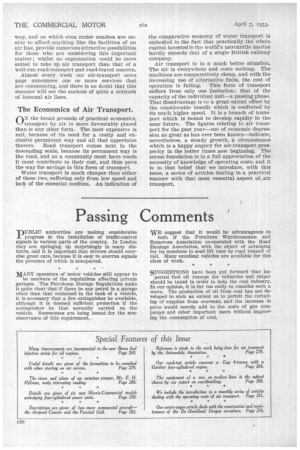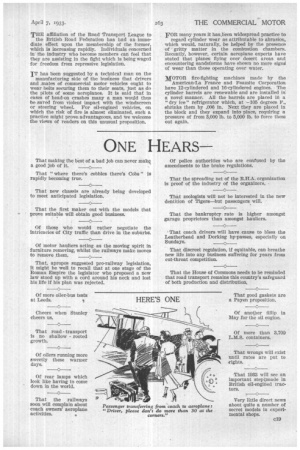Passing Comments
Page 40

Page 41

If you've noticed an error in this article please click here to report it so we can fix it.
ITho "IRMO authorities are making considerable progress in the installation of traffic-control signals in various parts of the country. In London they are springing up surprisingly in many districts, and it is important that drivers should exercise great care, because it is easy to overrun signals the presence of which is unexpected.
MANY operators of motor vehicles still appear to be unaware of the regulations affecting private garages. The Petroleum Storage Regulations make it quite clear that if there be any petrol in a garage other than that contained in the tank of a vehicle, It is necessary that a fire extinguisher be available, although it is deemed sufficient protection if the extinguisher be that normally carried on the vehicle. Summonses are being issued for the nonobservance of this requirement. WE suggest that it would be advantageous to both if the Furniture Warehousemen and Removers Association co-operated with the Road Haulage Association, with the object of arranging for its members to send lift vans by road instead of rail. Many excellent vehicles are available for this class of work.
SUGGESTIONS have been put forward that im ported 'fuel oil (except for refineries and ships) should be taxed in order to help the coal industry. In our opinion, it is far too early to consider such a move. The production of oil from coal has not developed to such an extent as to permit the curtailing of supplies from overseas, and the increase in price would merely add to the costs of gas C0111pantes and other important users without improving the consumption of coal. THE affiliation of the Road Transport League to the British Road Federation has had an immediate effect upon the membership of the former, which is increasing rapidly. Individuals concerned in the industry who become members can feel that they are assisting in the fight which is being waged for freedom from repressive legislation.
IT has been suggested by a technical man on the manufacturing side of the business that drivers and mates of commercial motor vehicles ought to wear belts securing them to their seats, just as do the pilots of some aeroplanes. It is said that in eases of head-on crashes many a man would thus be saved from violent impact with the windscreen or steering wheel. For oil-engined vehicles, on which the risk of fire is almost eliminated, such a practice might prove,advantag-eous, and we welcome the views of readers on this unusual proposition. FOR many years it has .been widespread practice to regard cylinder wear as attributable to abrasion, which would, naturally, be helped by the presence of '"gritty matter in the combustion chambers. Recently, however, certain aeroplane experts have stated that planes flying over desert areas and encountering sandstorms have shown no more signs of wear than those operating over water.
MOTOR fire-fighting machines made by the American-La France and Foamite Corporation have 12-cylindered and 16-cylindered engines. The cylinder barrels are renewable and are installed in a novel manner. All the barrels are placed in a "dry ice" refrigerator which, at —105 degrees F., shrinks them by .006 in. Next they are placed in the block and they expand into place, requiring a pressure of from 3,000 lb. to 5,000 lb. to force them out again.












































































































